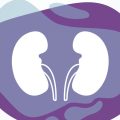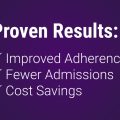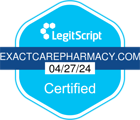
Helping Diabetic Patients with Medication Management
Poor diabetes management can lead to unnecessary health care visits and hospitalizations. In fact, diabetes is ranked second behind congestive heart failure as the primary diagnosis at entry into home care.1
Whether a patient has been newly diagnosed or has been managing diabetes for a while, they often face a variety of daily challenges. While managing lifestyle, diet and exercise, patients also have to juggle complex diabetes medication management routines.
Studies have shown that approximately 33% of oral diabetes medications and 38% of insulin are not taken/used as prescribed.2
Common Challenges for Patients Managing Diabetes
Complex Disease Profiles
People with diabetes often have comorbid chronic conditions that can affect their ability to manage their self-care. In fact, most adults with Type 1 or Type 2 diabetes have at least one additional concurrent chronic condition diagnosis. As many as 40 percent have at least three.1
The four most common comorbidities seen in people with diabetes are:
- Heart disease
- Kidney disease
- High blood pressure
- Depression
Due to these comorbidities, patients are likely taking multiple medications, which can create challenges when managing their conditions.
Poor Medication Adherence
Adherence is crucial to proper diabetes treatment and control. Poor adherence can have a negative impact on blood glucose levels in patients and can lead to other negative health outcomes.
Unfortunately, there are several reasons why patients don’t take their medications as prescribed. Some of the common reasons include:
- Forgetfulness
- Inconvenience
- Negative beliefs about treatment (such as fear of side effects)
- Fear of injections
- Cost
- Lack of knowledge and understanding
Multiple Prescribers and Pharmacies
Some patients may also be seeing multiple prescribing doctors and using multiple pharmacies to fill their prescriptions. This can add a level of confusion and even cause medication errors, such as drug duplications and drug interactions.
Helping Patients Manage Their Medications
Understanding Adherence Barriers
Identifying and understanding why patients may not be taking their medications as prescribed opens the door to help them improve adherence. Improving patient adherence can be supported with a collaborative conversation between the patient and his or her doctor or pharmacist. It’s important that, in this conversation, patients feel safe to be honest about their challenges.
Here are some communication tips you can use with patients to gain a better understanding about what is causing their non-adherence:
- Avoid judgmental statements and avoid the word “why”
- Listen more and talk less
- Ask open ended questions to avoid “yes” or “no” answers
- Ask questions to measure the patient’s confidence in taking their medications
- Ask patients how their medications help them to clarify their understanding
- Avoid healthcare jargon and abbreviations a patient might not understand
- Guide the conversation to give them the opportunity to discuss their challenges with taking medications as prescribed
- Brainstorm with the patient to identify solutions, rather than telling the patient what to do
Providing Medication Adherence Tools and Support
Medication adherence tools can help patients eliminate complexity from their daily routines, while eliminating the stress and confusion of medication management. This also allows them to focus on other areas of their daily healthcare routines and diabetes care. Some common and helpful medication adherence tools include medication synchronization, multi-dose adherence packaging, medication reminders and medication delivery.
Encouraging Patients to Use One Pharmacy
Using multiple pharmacies is not only inconvenient for patients, it also often prevents pharmacists from seeing the patient’s complete medication profile.
Pharmacists are an integral part of the patient’s healthcare team and can provide clinical support to optimize patient medication profiles—if they can see all of the medications the patient is taking. This helps medications to be safer and more effective.
With one pharmacy filling the patient’s prescriptions, the pharmacy team has access to the patient’s entire medication profile. This makes it easier to identify possible risks to patients and coordinate care with the rest of the patient’s healthcare team.
Patients with good self-care behaviors typically achieve optimal blood sugar levels. Diabetes is a challenging disease. But if we can help improve medication adherence for patients by promoting improved behaviors, we can help them reduce the risk of complications.
- https://spectrum.diabetesjournals.org/content/18/3/162
- https://bmcmedicine.biomedcentral.com/articles/10.1186/s12916-019-1362-1<







